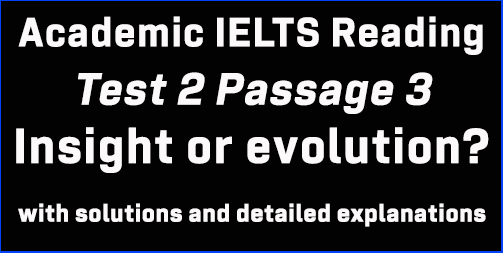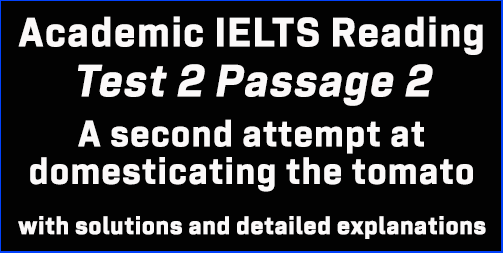IELTS General Training Reading: Cambridge 3 Test A Section 2; ASHWOOD COLLEGE & THE TOTARA LANGUAGE INSTITUTE NEW ZEALAND; with best solutions and explanations
This General Training IELTS Reading post focuses on solutions to IELTS Cambridge 3 Reading Test A Section 2 that has two texts titled ‘ASHWOOD COLLEGE’ and ‘THE TOTARA LANGUAGE INSTITUTE NEW ZEALAND’. This is a targeted post for GT IELTS candidates who have big problems finding out and understanding Reading Answers in the GT module. This post can guide you the best to understand every Reading answer without much trouble. Finding out IELTS Reading answers is a steady process, and this post will assist you in this respect.
IELTS Cambridge 3 Test A: General Training Reading Module
Section 2: Questions 14-19
The headline of the text: ASHWOOD COLLEGE
Questions 14-20: TRUE, FALSE, NOT GIVEN
[In this type of question, candidates are asked to find out whether:
The statement in the question agrees with the information in the passage – TRUE
The statement in the question contradicts the information in the passage – FALSE
If there is no information on this – NOT GIVEN
For this type of question, you can divide each statement into three independent pieces and make your way through with the answer.]
Question 14: Overseas students must pay a deposit when they apply for a course at the college.
Keywords for this question: overseas students, must pay, deposit, when, apply,
At the top of the enrolment details, we can see the condition for overseas students. It says,
“How to enrol if you are abroad . . .
Please complete the Application Form and send this with the correct Non-Returnable Deposit (see below) to: The Overseas Registrar, Ashwood College, 20 Glossop Street, Midhaven. . . .”
Here, abroad = overseas, Non-Returnable Deposit = the deposit that overseas students must pay,
So the answer is: TRUE
Question 15: Outstanding fees are payable by the end of the first week of the course.
Keywords for this question: outstanding fees, payable, by the end, first week,
Take a look at the bottom of the enrolment details.
Here, in the ‘Deposits/payment’ section, take a look at point no. 2,
“2. Any balance of course and accommodation fees must be paid in full by the first day of your course.”
So, the answer is: FALSE
Question 16: Classes are organised according to ability level.
Keywords for this question: classes, organised, ability level,
Take a look at the bottom of the enrolment details.
Here, in the ‘Location and Time of Courses’ section, take a look at lines 3-5, “Before entry to the school, students must take an entry test to determine the level of class they enter. .. . .”
Here, entry test to determine the level of class they enter = classes are organised according to ability level,
So, the answer is: TRUE
Question 17: There is a break between each lesson.
Keywords for this question: break, between, each lesson,
Again, at the bottom of the enrolment details, have a look at the first point of the ‘Conditions’ section.
“Timetable
Each hour consists of 50 minutes’ tuition and a 10-minute break.”
This line suggests that there is a 10-minute break between each lesson.
So, the answer is: TRUE
Question 18: Students may change courses at any time during the term.
Keywords for this question: students, may change courses, any time, during, term,
This text does not contain any information about changing courses during term.
So, the answer is: NOT GIVEN
Question 19: Any student is permitted to take a week’s holiday during a 12-week course.
Keywords for this question: any student, permitted, take, week’s holiday, during, 12-week course,
Again, at the bottom of the enrolment details, take a look at the ‘Student Holidays’ section,
“Students on long courses except examination preparation courses may take a holiday of one week every 12 weeks without losing their course fee for this period.”
Here, except examination preparation courses = students in examination preparation courses cannot take holiday,
So, the answer is: FALSE
The headline of the text: THE TOTARA LANGUAGE INSTITUTE NEW ZEALAND
Questions 20-26: Summary completion:
[In this kind of questions candidates are given a summary for one, two or three paragraphs with some fill in the blanks questions. Candidates need to find out the related paragraphs by correctly studying the keywords from the questions. Then, they should follow the steps of finding answers for fill in the gaps.]
Example question: Overseas students who study at _____ may choose to spend more of their free time .. . .. .
Example answer: Totara Language Institute
Question 20: with local students by applying for a room in the _________ .
Keywords for this question: local students, by applying, for, room, in the,
Take a close look above the first big paragraph. The author says here, “Choice of accommodation for all students – homestays with local families or in Halls of Residence with New Zealand students.”
Here, Choice of accommodation = room, New Zealand students = local students,
So, the answer is: (University) Halls of Residence
Question 21: Places are available here even for students enrolled on the minimum length course of _________.
Keywords for this question: places, available, even for students, enrolled, minimum length course,
In the beginning of the text, take a look at the points given.
“Study English in a national university with students from many countries.
- 4-week blocks”
Here, 4-week blocks = minimum length course – 4 weeks,
Also, in the first paragraph, look at lines 2-3, “ .. . .. Intensive English classes are taught in four-week blocks throughout the year and students may enrol for as many blocks as they wish. … .”
So, the answer is: 4/ four weeks
Question 22: Class sizes for each course range from _________ students and all the class teachers are well qualified; many of them teach on graduate programmes in areas such as applied linguistics.
Keywords for this question: class sizes, each course, range from, all the class teachers, well qualified,
In the first paragraph, the writer says in lines 7-8, “ . .. .. Classes are small, usually from 10-12 students with a maximum number of 15, and normally contain a mix of students from a wide range of countries. … .. .”
Here, from 10 = minimum 10 students, maximum number of 15 = maximum 15 students,
So, the range of students is 10-15.
So, the answer is: 10-15 / ten to fifteen
Question 23: As a member of the Language Institute you will automatically be able to join the ________.
Keywords for this question: as, member, will automatically, be able to join,
Lines 8-9 of the first paragraph say, “ . . . . Students who study English at the Language Institute become international members of the Waikato Students’ Union. … .. .”
Here, Students who study English = As a member, become = will automatically be able to join,
So, the answer is: (Waikato) Students’ Union
Questions 24 & 25: Hamilton can offer students a wide range of social activities. The city itself lies on either side of the 24. ________ which results in some very 25. ________ views and enjoyable walks in the gardens.
Keywords for this question: Hamilton, offer, wide range, social activities, city, lies on, either side of, results in, some very, views, enjoyable walks, gardens,
The first few lines of the second paragraph say, “Hamilton, one of New Zealand’s fastest growing cities, is ideally located for a wide range of leisure and cultural activities. The Waikato river, the longest river in New Zealand, flows through the centre of the city, providing a picturesque and park-like setting of riverside walks and gardens.
Here, leisure and cultural activities = social activities, flows through the centre of the = the city itself lies on either side of the river, providing = results in,
So, the answers are:
- (Waikato) river
- picturesque
Question 26: The Institute employs an activities co-ordinator who can help you organise your free time and you may also wish to make use of this service for planning your ________ when you leave New Zealand. Remember that a student permit is not valid when you have finished your studies.
Keywords for this question: Institute, employs, activities co-ordinator, help, organise, free time, may also wish, make use, for planning, when, leave New Zealand,
In the final paragraph, the author of the text says in lines 1-3, “The Language Institute activities co-ordinator can assist students to arrange any sport and leisure activities. Assistance is also available for ongoing travel arrangements for students. Students on a visitor visa or work permit may study for a maximum of 3 months. .. .. .”
Here, assist = help, arrange any sport and leisure activities = organise your free time, wish to make use of this service = assistance is also available,
So, the answer is: (ongoing) travel (arrangements)
Click here for solutions to Cambridge 3 GT Test A Section 1
Click here for solutions to Cambridge 3 GT Test A Section 3




2 thoughts on “IELTS General Training Reading: Cambridge 3 Test A Section 2; ASHWOOD COLLEGE & THE TOTARA LANGUAGE INSTITUTE NEW ZEALAND; with best solutions and explanations”